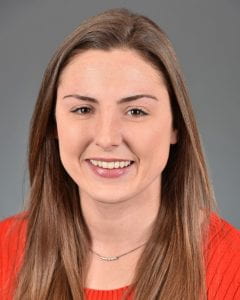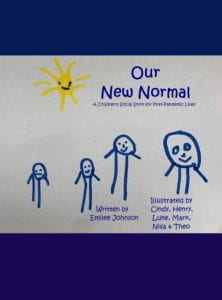
PMC graduate Emilee Johnson
As early care and education (ECE) programs fully re-opened after the pandemic-related suspension in 2020, educators and caregivers noticed that many children were anxious about doing things that have been—for nearly all of human history—considered normal: playing in large groups and being outside without having to wear a mask.
In response, Emilee Johnson, the educational coordinator at Boston Children’s Hospital Child Care Center, wrote “Our New Normal: A Children’s Social Story for Post-Pandemic Lives.”
Published last June, the book provides guidance about how to address the concerns of children and parents about whether it was genuinely safe to loosen COVID-19-related restrictions (many of which have since been reinstated due to the Delta variant). Even during outside activities, says Johnson, children had so internalized the messages about health and safety that they were reluctant to remove their masks.
“They would tell us, no, that’s not healthy. We have to be healthcare heroes, we have to wear masks,” she recalls.
The book “speaks to many children’s anxieties, fears, or questions about what comes next,” Johnson says.
Johnson wrote the book using language drawn directly from her conversations with children at the center and used their illustrations in “Our New Normal” as well. It was originally meant only for the children in their two preschool classrooms, to prepare them for the newest round of pandemic-related protocols. The director of the center, however, believed the book to be a valuable resource that needed wider distribution and encouraged Johnson to try to find a publisher. Johnson eventually self-published “Our New Normal” with support from Boston Children’s Hospital and has provided copies to parents and other programs at no cost.

“Our New Normal” provides guidance about how to address the concerns of children and parents around loosening COVID-19-related safety restrictions.
Creating the book and making it widely available (it can be purchased on Amazon), is a textbook (no pun intended) example of the relational-entrepreneurial leadership shown by graduates of our Early Educator Leadership Fellowship in the Post-Master’s Certificate in Early Education Research, Policy, and Practice (PMC) who implement innovative ideas to solve problems of practice.
Writing social stories for the children in her center has long been part of Johnson’s work. But without the leadership growth sparked by her participation in the PMC, Johnson says she might not have recognized the value of making “Our New Normal” more widely available.
She’s currently working on a follow up book called “Masks Are A Tool,” which will be made available in both English and Spanish, in an effort to keep pace with the ever-changing pandemic.
Johnson applied for the Leadership Fellowship in the PMC program shortly after she had been promoted to her current position from her prior role as lead preschool teacher. As an early educator with nearly two decades of experience in a variety of ECE and special education settings, Johnson knew she was a good teacher. But when she was promoted to educational coordinator in 2018—just as the center had doubled in size—Johnson worried she might have gotten in over her head.
“I was scared,” she recalls, adding that she had never held an administrative position before.
New responsibilities that took her out of the comfort of the classroom—observing teachers, overseeing curriculum planning, being accountable and available to many more parents than she had been as a classroom teacher—felt daunting, Johnson says.
It didn’t help, Johnson adds, that she also felt insecure about her ability to lead.
“I’m laid back, and I was worried that that aspect of my personality would result in my being walked on by other people,” says Johnson. “I was worried that people wouldn’t see me as a leader because I was just a teacher and that I wasn’t ready for this step up. I wasn’t as confident as I needed to be going into it.”
Still, she was excited about the new position and wanted to succeed. Aware that she needed additional training and support to be successful in her new leadership role, Johnson enrolled in the PMC program.
Was it helpful?
Johnson says yes.
“We were encouraged to come to class with real-world questions and real-world problems that we would solve together,” says Johnson, adding that it was an unexpected, but refreshing, change from the PowerPoint lectures of her undergraduate days.
“It was all real-world, real-life stuff. And that’s why it mattered. That’s why it was so beneficial and inspiring,” says Johnson.
In this environment, Johnson was able to get the feedback and support she needed to make the transition from teacher—a job she said will always be “her first love”—to educational coordinator.
“I wanted to move into a leadership position, but I also knew that I was going to horribly miss the classroom,” she says. “Many of the people that I was in these courses with had been in leadership positions for a more extended period of time so they were able to support me with how this transition would look, and that really was what I needed.”
Johnson says that learning that there are many ways to lead was something of an epiphany. Johnson’s initial ideas about leadership was that it consisted of telling people what to do, performing administrative tasks, and having difficult conversations when things go wrong.
But the relational-entrepreneurial model of leadership taught in the PMC, Johnson says, “is about modeling how to be a great educator, it is about supporting your team, and being there for your team.”
Johnson also came to view her laid-back personality as a leadership strength because her natural style is to be a team player—and her staff is a team.
“That really made me understand that leadership is something that I was capable of,” says Johnson. “It’s just going to look different, maybe, than what I had seen in the past from other leaders.”
These days, Emilee is comfortable and confident in her post at the Boston Children’s Hospital Child Care Center, which includes eight classrooms that educates infants, toddlers, and preschoolers with a completely play-based, child-centered curriculum that draws on approaches like Montessori and Reggio Emilia, among others.
“Our main focus is just to create curricula that is engaging to children and is scaffolding their learning in the most appropriate and engaging ways,” she says.
In addition to curriculum development, Emilee spends her days addressing developmental and behavioral concerns about students, fielding questions from teachers and parents about child development, and supporting children and families more generally—especially now that the lifting of COVID restrictions has enabled center staff to resume in-person meetings with parents and caregivers.
“Without the PMC, I would not have had as many role models to emulate as I moved into my new role,” Johnson says. “In the program, professors and other students kind of pull your weaknesses from you and show you the areas where you still need to develop. But they also pull your strengths and show you how to build on them, and I put these skills to use every day now.”

